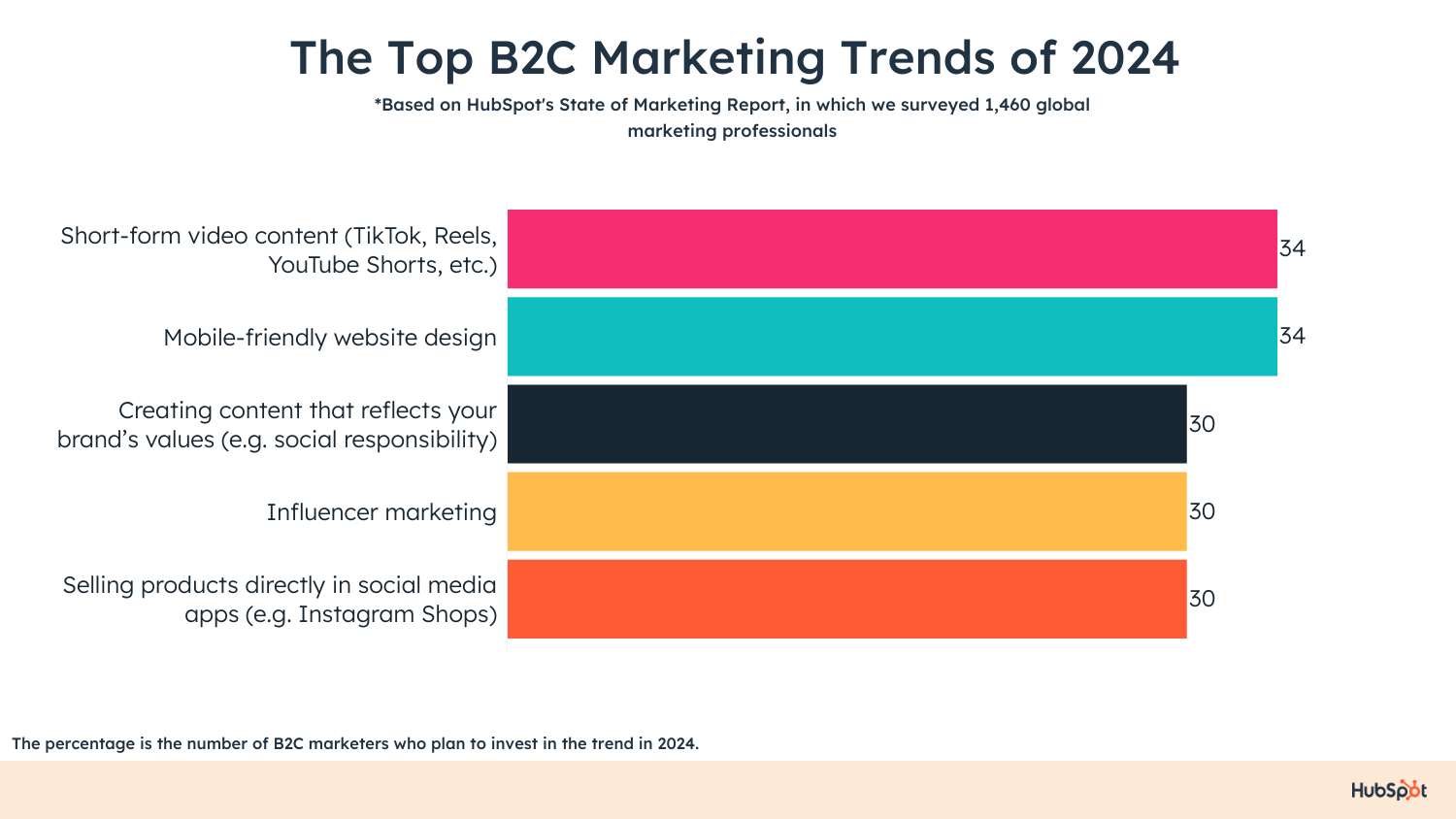In 2024, 43% of B2C marketers plan to increase their marketing budget.
The question is: Where is that budget going? Will marketers reinvest in the same strategies or try new trends?
To understand what trends B2C marketers are leveraging in 2024, we surveyed 1,460 global marketing professionals working in B2B and B2C companies.
From influencer marketing to short-form video, there are so many efforts brands can focus on. Let's see what our latest research says about what worked well for B2C marketers this year and where they plan to invest in 2024.
1. Short-form video content will be a top priority for B2C marketers.
Short-form video took off in early 2020 and shows no signs of slowing down.
Back then, TikTok was the number one place to go for short-form content. Today, Instagram Reels and YouTube Shorts are also competing for users' attention.
This is good news for brands, as short-form video trend content resulted in the biggest ROI for marketers in 2023.
Additionally, 34% of B2C marketers said short-form video is the #1 trend they plan to invest in in 2024.
Why now? Well, short-form video is a key feature in social media today.
Last Crumb, an LA-based homemade cookie company, is a good example of a B2C brand dominating short-form video. They have over 200K followers and over 2 million likes on TikTok, and their videos are light-hearted and fun, with a healthy mix of user-generated videos and studio-produced clips:
Ultimately, short-form video is a powerful strategy for reaching new audiences.
As Director of Research & Training at Blue Frog, Jillian Streit, told me: “For the generations that prefer to listen and watch their content, short-form videos offer a unique opportunity to showcase your brand personality that is more difficult to do through imagery or text. With storytelling and a little humor, you can connect with your audience more personally and generate longer-lasting loyalty in your customers.”
Streit adds, “Organizations that sell tangible products should utilize short-form videos to quickly and efficiently showcase key features and uses of your products.”
Today, with so many platforms offering in-app shopping experiences and advanced ad formats, brands can meet more of their marketing goals.
2. B2C marketers will lean into mobile-friendly website design.
34% of B2C marketers say mobile-friendly website design is the top trend they're focused on in 2024.
To understand why mobile-friendly web design matters so much for B2C brands, I spoke with Bill Lorimer, Associate VP, Ecommerce at SmartBug Media.
Lorimer told me, “Mobile-friendly design is more than just a buzzword – it’s a crucial strategy to stay ahead of the competition and ensure a positive digital experience for your brand. Prioritizing mobile optimization turns your e-commerce site into a magnet for on-the-go shoppers, offering them a seamless and enjoyable experience regardless of the device they’re using.”
He adds, “Mobile-friendliness isn’t just about the front-end experience, either: Search engines also prioritize mobile-friendly sites over ones that aren’t. Ultimately, investing in mobile optimization translates into increased traffic, higher conversion rates, and greater revenue generation, making it a fundamental strategy for the success of your brand in today’s digital landscape. If this isn’t a priority for your brand, be ready for challenging times ahead.”
Unsure where to begin? Take a look at our guide on optimizing your site for mobile users.
 3. B2C marketers will become obsessed with creating content that reflects their brand’s values (e.g. social responsibility).
3. B2C marketers will become obsessed with creating content that reflects their brand’s values (e.g. social responsibility).
Manuela Gaitan, Head of Marketing at Awtana, told me: “There has been a growing trend towards creating content that reflects a brand's values, particularly those centered around social responsibility. While this approach may not be as popular as focusing solely on product features or lifestyle imagery, it's proving to be a worthwhile investment for B2C companies.”
Gaitan believes there are three reasons creating content that reflects brand values is important for B2C marketers. As she puts it:
- Aligning marketing content with a brand's values helps establish a deeper emotional connection with consumers. By showcasing a commitment to social responsibility through content, companies can resonate with their target audience on a more profound level, fostering loyalty and trust in the process.
- Communicating brand values in marketing content can set a company apart from its competitors in a crowded marketplace. By highlighting these values, B2C companies can carve out a distinct identity for themselves, attracting like-minded consumers who are drawn to their mission and purpose.
- Investing in content that reflects brand values can have long-term benefits for a company's reputation and bottom line. By demonstrating a genuine commitment to social responsibility through their content, companies can enhance their reputation as ethical and socially conscious entities, which can translate into increased customer loyalty and positive word-of-mouth.
A whopping 46% of B2C marketers plan to increase their investment in creating content that reflects their brand’s values in 2024. As your competitors increase their investments, you'll want to consider doing the same.
4. Influencer marketing will reign supreme.
For most B2C marketers, the power of influencers is clear.
In 2023, 54% of B2C marketers worked with creators or influencers — and 49% plan to increase their investments in influencer marketing in 2024.
This is because in 2023, influencer marketing offered businesses the best returns. When asked to select their top ROI driver from a list of 26 tactics and strategies, 12% of marketers chose influencer marketing — ahead of AI/automation and native advertising.
I can personally attest to the power of influencer marketing: Almost daily, I am purchasing B2C products from my latest favorite influencer. Most recently, I've bought skincare products, an Amazon head-scratcher, and a daily vitamin supplement — all thanks to influencer marketing.
5. B2C marketers will lean heavily into social selling.
Speaking of my aforementioned online shopping habits: Social selling will be huge in 2024.
In fact, 30% of B2C marketers predict it will be the top trend of the year.
As seen in our Consumer Trends survey, social media is the future of shopping. Within Gen Z, Millennials, and Gen X, social media is the preferred channel for product discovery. Among all consumers, there is a growing number of social media users who buy on social media.
That number is especially high among younger generations, with 27% of millennials and 22% of Gen Z purchasing products directly in-app.
When determining how to sell products on social media, it‘s critical you start with the platforms on which you already have a following. For instance, if your brand sees high engagement on Instagram, it makes sense to start selling your products to your Instagram audience, who’ve already demonstrated interest in your brand.
![Download Now: Free State of Marketing Report [Updated for 2024]](https://no-cache.hubspot.com/cta/default/53/b0f73a5e-16e4-41fd-9511-8564efc560a7.png)
